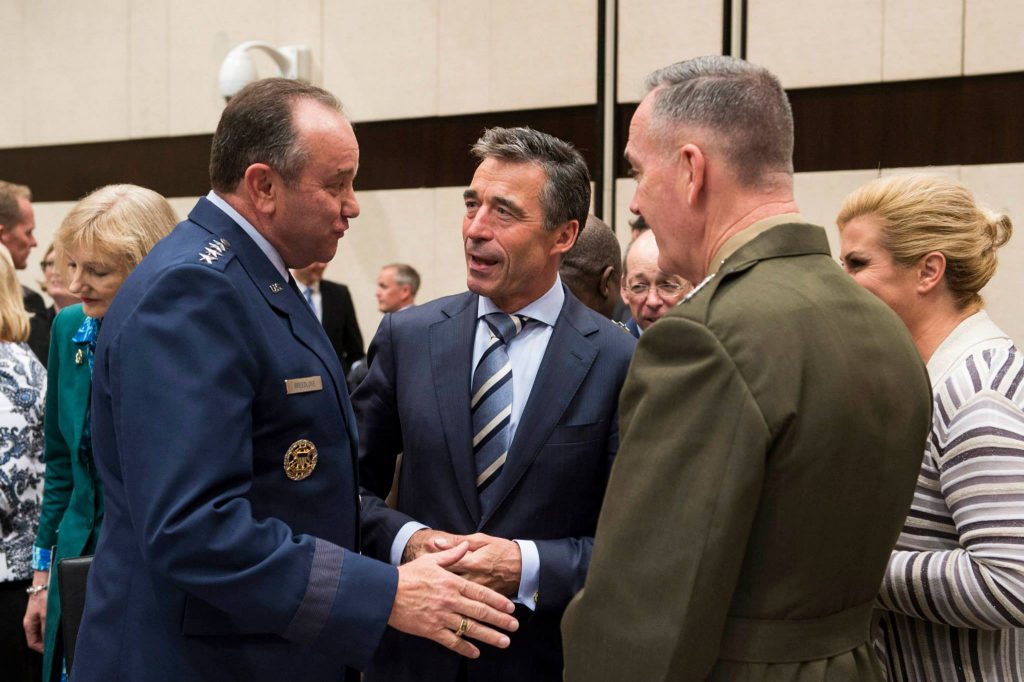
From Philip Breedlove, Department of Defense: These are dynamic times, and I’m invigorated by the challenges and opportunities in front of us today, and encouraged by the passion and the professionalism of the whole NATO team to meet those challenges and to address those opportunities.
As I look across the alliance, I see that although there is great stability on the whole within our many country borders, just beyond those borders in many cases there is uncertainty and insecurity.
And so as SACEUR my first and enduring priority will be to ensure that NATO remains vigilant and prepared to meet the challenges and the threats of the future with agile, capable and interoperable military forces.
The fundamental priority lies at the core of the military alliance, and it will remain front-and-center while I am the commander.
My other top priority now and in the immediate future is the transition in Afghanistan as the ANSF [Afghan National Security Forces] readies itself to take responsibility for security across the country. General Dunford, who I think you’re going to meet with later today, and many others are here with the ministers to take a final look at the concept of operations for the new NATO mission there, which we call Resolute Support.
This train, advise and assist mission will be the fruition of more than a decade — or a decade of sacrifice and hard work on the part of ISAF [International Security Assistance Force] and other contributing nations alongside the Afghan security forces.
The gains of the people of Afghanistan have been made over this past decade must not be put at risk, and NATO is ensuring that they won’t be.
As we move forward with the guidance on this concept, our planning teams will put together a more detailed operational plan in the coming months that will lay out more specifically how NATO, with the support of the international community, will fulfill the Resolute Support train, advise and assist mission.
One of the areas from which threats are continuing to emerge is cyber. My predecessor said that in this area, NATO has the largest gap between our preparedness and the threat. We will be discussing these very issues during this conference. We have a defensive effort that is continuing to strengthen our ability to protect our networks, but the work is far from complete. And as I’ve mentioned, we recognize that these threats continue to evolve.
Our center of excellence in (inaudible) is part of the way ahead for NATO to find better ways to reinforce the strength of the integrity of our networks and, hence, our security. This will undoubtedly not be the last time we discuss the many challenges that comes from this evolving threat.
Finally, in my role as the EUCOM [United States European Command] commander, I’m working intensely with my European colleagues and other partners to emphasize the strength and the vibrancy of our trans-Atlantic linkages. Our security is deeply interwoven and supported by the deep roots in both economic and cultural shared values with our neighbors in Europe. These relationships have endured for decades and will continue to thrive through all of our challenges, whether they are economical or tactical.
The U.S. is certainly paying closer attention in Asia militarily than it has in the recent past, but it is doing so along with the rest of the world. Our past, present, and our future is deeply linked with our NATO allies, and there is no doubt that we will continue to best secure our future together as a fully committed, full-time member.
Excerpts from news conference with with SACEUR Gen. Philip Breedlove in NATO Headquarters. (photo: NATO)
Image: nato%206%206%2013%20breedlove%20rasmussen.jpg
